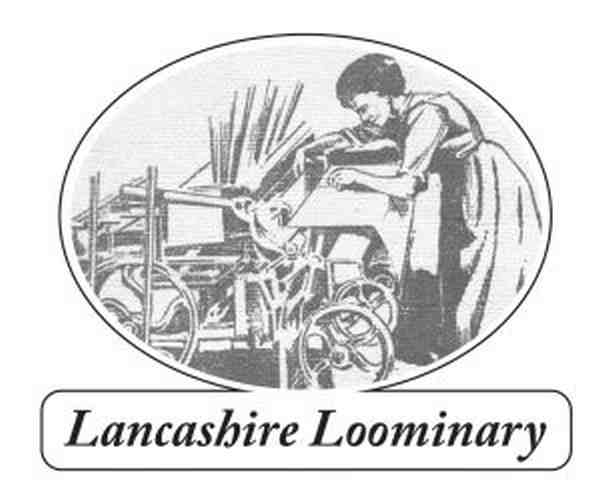THE LANCASHIRE LOOMINARY
An occasional update No. 10 October 2022
Here’s the latest ‘Loominary’, with updates on publications, news of book launches and this and that. There’s a link to my latest ‘Northern Weekly Salvo’ if you don’t already get it. I’ve just finished the first draft of a major writing project which I’ll say more about in a few weeks. I started writing it at the beginning of the year. All being well it will appear next June.
Last Train from Blackstock Junction has arrived ….but you can still get it.
My new collection of short stories, set on and around the railways of the North of England, is now available. ‘Last Train from Blackstock Junction’ is the title story for a collection of 12 tales of life on the lines, set variously between 1900 and 2022. It’s produced by Platform 5 Publishing, who also publish Today’s Railways.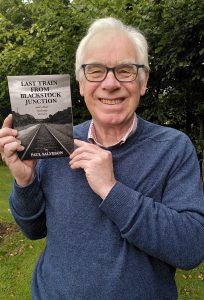
‘The Station Clock’ is set on the Furness Line today and is a bit of a supernatural fantasy, which brings in the days of the Barrow Blitz of 1941. ‘Who Signed the Book?’ is a ghost story, set in Lancashire and Yorkshire Railway days and in the 1980s, in my old signalbox, Astley Bridge Junction. The stories deal with difficult issues of racism and sexism, the early days of the labour movement and trade unionism on the railways. The stories aim to be readable and enjoyable, but sometimes challenging. Not just for a railway readership! Sir Peter Hendy, chair of Network Rail, has written a very complimentary foreword.
It sells at £12.95 but subscribers to Today’s Railways get a reduced rate. Readers of Lancashire Loominary will also get a discount if you buy online – please enter LAST22 in the promotional code box at the basket and the unit price will change from £12.95 to £10.95. Go to www.platform5.com
We’ve done three launches – at Elsecar Heritage Centre, near Barnsley, the Platform 5 Gallery at Bolton Station and in Carnforth Station
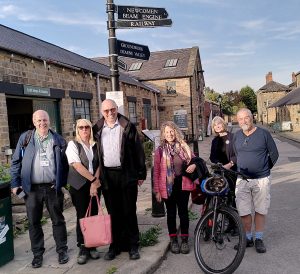
Heritage Centre. All went well, Bolton had most people present but it’s not really about numbers. Thanks to all who came and special thanks to Elsecar Heritage Centre, Platform 5 Gallery and Chris Jackson of Northern who spoke at Bolton and to Furness Line Action group and Carnforth Heritage Centre. I’m happy to do further talks on the book and the background to the stories.
Book fairs around the North
I love a good book fair. Last Saturday’s in the Village Institute at Hornby, had all the right ingredients: a good range of stalls, some bargains, and some home-made cakes with tea and coffee to relax in between book searching and chat. It’s also in a lovely part of Lancashire. I made several purchases, justifying it (as if I needed to) as it’s nearly my birthday. Probably the best find was Charles Rowley’s Fifty years of Work Without Wages, about his campaigning and artistic work in Manchester and Ancoats in particular. It includes a lot about his friendship with the socialist artist Walter Crane and also his meetings with Peter Kropotkin, the Russian anarchist who lived in Manchester for a while. I’d lost my copy of CLR James’ Beyond a Boundary so I picked up a copy on Bob Jones’s Northern Herald stall. As a recent visitor to Blackpool (see below) it was nice to find a copy of John Walton’s Riding on Rainbows: Blackpool Pleasure Beach and its Place in British Popular Culture. The history of the co-operative movement in the North is patchy (my forthcoming book has a chapter on it). I hadn’t seen Robin Martakies’ Co-operative Societies in North Lancashire and Cumbria 1860 – 2011, so another addition to the collection. There were several stalls with railway material, including some lovely handbills and posters; I resisted the temptation.
There are several book fairs coming up: Saturday October 8th at Barton Village Hall, Clapham on October 16th and Central Library Lancaster November 26th. Last of the year is at Gargrave Village Hall on December 3rd. For details and a subscription to North West Bookfairs Newsletter contact Gerry Cotter – gerrycotterbooks@gmail.com
Wet night in Blackpool
I persist in maintaining hallowed tradition of my yearly trip to Blackpool, round about this time of year, to see the Illuminations. I missed a few in recent years because of covid but managed to honour tradition last week, on the way back from Carnforth. It wasn’t a resounding success, I have to say. After a stunning sunset over Wyresdale, and a pleasant stop at The Stork, Conder Green, the weather ‘set in’. The rain was cold, wet and that sort of horizontal rain that you only get at the seaside. We did manage to get a tram ride, from Little Bispham to Pleasure Beach, then back up to North Pier to seek out a fish and chip restaurant. Our recommended choice, Papa’s, had just stopped serving so we went to Harry Ramsden’s, nearby. It’s a nice atmosphere with friendly staff; the fish was excellent but it lost points on the chips. Other recommendations for the next trip are welcome.
Afternoon at Hest Bank in search of T.H. Mawson
Before the ill-fated trip to Blackpool we called in at Hest Bank, a favourite spot of mine going back to watching steam in the 60s. A great place to watch ‘Brits’ pounding through on their way north, and also watch locos taking water from the troughs just north of the level crossing. The crossing, and the 1960s style signalbox that controls the gates, are still there. We spent several minutes waiting at the barriers to let various trains, passenger and freight, fly past, allowing time to admire a timeless scene ‘watching the trains go by’. Part of the reason for the visit was to find the former home of Thomas Hayton Mawson, the landscape architect and collaborator with William Hesketh Lever, later ‘Lord Leverhulme.’ Here’s a potted biography.
He was born near Garstang and left school at age 12. His father worked in a cotton mill and later set up a building business. He started work in the building trade in Lancaster, then worked at a London nursery where he developed his skills as a landscape gardener. he moved back north and won several commissions at houses around the Lake District. From the 1890s he became a well-known landscape designer, doing work in the Lake District but also in Wales. In 1908 he was commissioned to design Barrow’s municipal park. In 1900 he wrote The Art and Craft of Garden Making.
His first project for William Lever was the garden at The Hill, in Hampstead; it was the beginning of a long-lasting but sometimes tetchy relationship. He went on to design Rivington gardens and Lever Park for Lever and his home at Thornton, Cheshire. He was commissioned by Lever to produce a radical plan for Bolton which was published in 1916 as Bolton As It Is and As It Might Be, following on from a series of lectures he gave to Bolton Housing and Town Planning Association. In 1923 he became president of the Town Planning Institute (now the RTPI) and in 1929 the first president of the Institute of Landscape Architects. He died, at the age of 72, at Applegarth, the house he designed at Hest Bank, next to the West Coast Main Line. He is buried at Bowness Cemetery, overloong Lake Windermere.
So there you go. I had the impression that ‘Applegarth’ was on the foreshore, along the track from the level crossing. I couldn’t find any sign of it; can anyone point me to where Mawson’s home was?
Lancashire’s Taj Mahal and the Man who Made It
Let’s maintain the ‘north Lancashire’ theme and look at and interesting aspect of Lancaster history. The city had a flourishing linoleum industry in the nineteenth century, developed by James Williamson, who subsequently became ‘Lord Ashton’. He built Williamson Park and the associated monument, known as the Lancashire Taj Mahal.
There was a related business in fabric and sail cloth which was owned by the Storey family’; and therein hangs a tale.Storey worked for Williamson for a short time before the two parted company, with William Storey starting his own company, Storey Brothers. They became sworn rivals of the Williamsons, latter day Montagues and Capulets. It was economic, political, and, it seems, very personal.
By 1894, Williamson was employing 2,500 men and Storey about 1,000. Both saw themselves as philanthropists though in the case of Lord Ashton it came at a price. In 1909 the Independent Labour Party put up a candidate against him in Skerton ward and came very close to winning. Two years later, at another municipal election in the same ward, there was a tied vote between the ILP and Lord Ashton’s Liberal nominee, John Turvey. The Mayor, as the returning officer, gave the casting vote to Turvey. Less than a week later, notices were posted at the works, saying that advances in wages that had been agreed would not now take place. The notice also stated that: “in future employees would not be kept on at times of coal or railway strikes… (and) …that when times were bad, only men loyal to the firm, would be kept on and we shall not, as in the past, keep those who are bereft of all sense of what is due not only to their employer, but to themselves.” So there!
Lord Ashton also declined to make any further contributions to local charities, buildings or public events. When I was a student at Lancaster I remember being told by an elderly former employee that Ashton gave his employees a celebratory tin of chocolate on some special occasion. Some of the workers scoffed the chocolates and then defecated in the tins which they then threw over the wall of his lordship’s residence.
The Storey family has a less controversial history. They helped to fund several projects around Lancaster including the Westfield Memorial Village, for First World War veterans. Thomas Storey provided the funding for the Storey Institute, opened in 1891 for ‘the promotion of art, science, literature, and technical instruction’. It continues to the present day as a lively and progressive arts venue, in the ownership of Lancaster City Council.
The latest Salvo no. 306
Here’s the latest Salvo, published online a few days ago. It features thoughts on the monarchy and the new king, levelling-up, or down, and a fascinating piece on a radical imitative of the 1790s – The Manchester Thinking Club. It’s here: http://lancashireloominary.co.uk/index.html/northern-weekly-salvo-306
Lancashire humour
Lancashire’s once dominant industry, cotton, spawned its own extensive genre of comedy. A particular butt of hundreds of jokes was ‘the tackler’, or ‘overlooker’ – the man (for it always was) who maintained and repaired the looms, mostly operated by women weavers. Penny pamphlets of ‘Tackler’s Tales’ were sold in their thousands in the early years of the twentieth century. I’ve a much-thumbed copy of Tacklers’ Yarns – fun from the weaving shed which indicates it being ‘third edition – thirtieth thousand’. The stories were collected by ‘Owd Shuttle’ and it was priced fourpence.
Papers such as The Cotton Factory Times published many of them. It carried a regular feature, ‘Mirth in the Mill’, with stories submitted by readers and illustrated by dialect writer and cartoonist Sam Fitton. They often had a Labour or trade union message, or against poor working conditions. Many of them have been brought together in Alan Fowler and Terry Wykes’ Mirth in the Mill: The Gradely World of Sam Fitton.The humour behind ‘Tacklers’ Tales’ was based on worpklace stereotypes of the dim-witted but often big-headed tackler. ‘Enough Said’ is a reflection on the low standards of hygiene of some of the profession:
Two tacklers were taking a bathe at Blackpool, When they enterered the water one said to the other: “I’ll thi wad, Bill, tha did’d hawve want a weysh.”
“Did I?” remarked Bill, looking unconvernedly at his grimy body. “But dornd forget I’m three year owder ner thee!”
Nature notes
After an exceptionally good season for blackberries and apples it’s now ‘conker time’ and I’ve collected several excellent specimens around Moss Bank Park. Only trouble is I’ve nobody to fight with. When I was nine or ten we’d pickle them in vinegar so’s to make them extra strong, thread a piece of string through the middle and aim to whack your opponent’s conker into destruction. Anyway, it’s probably unbecoming of a person my age to be indulging in such childish (not to say aggressive) activities. Anyway, I’m working my way through the blackberry and apple ‘compőte’ that I’ve made. Very nice with porridge and cereal. Interesting fact: ‘conker’ in Hungarian is gesztenye.
Walk – and ride – in the park
Good to see the Moss Bank Park Miniature Railway operating once more. 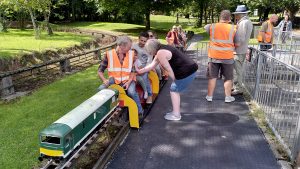 After the attack by metal thieves the railway’s appeal has proved successful and the track is gradually being re-laid. Not quite there yet but the railway is able to operate an ‘out and back’ service, for donations.
After the attack by metal thieves the railway’s appeal has proved successful and the track is gradually being re-laid. Not quite there yet but the railway is able to operate an ‘out and back’ service, for donations.
Lancashire’s Romantic Radical – special offer
Allen Clarke was many things – socialist, spiritualist, dialect writer, philosopher, historian and comic. The new and updated edition of my biography of him – Allen Clarke – Teddy Ashton – Lancashire’s Romantic Radical – is now available at a special price to Loominaries for £10 plus £3 post (or free personal delivery if local). 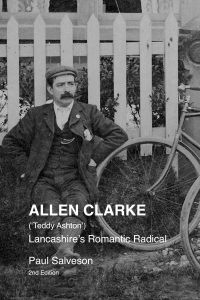 The book is substantially up-dated from the 2009 edition and has a lot of new material in it, including an entirely new chapter on Clarke’s railway writings. You can download an order form from my website, below, or there’s one at the back of this newsletter: http://lancashireloominary.co.uk/index.html/order-form. It is available on kindle price £8.99
The book is substantially up-dated from the 2009 edition and has a lot of new material in it, including an entirely new chapter on Clarke’s railway writings. You can download an order form from my website, below, or there’s one at the back of this newsletter: http://lancashireloominary.co.uk/index.html/order-form. It is available on kindle price £8.99
Moorlands, Memories and Reflections
2020 was the centenary of the publication of Allen Clarke’s Moorlands and Memories, sub-titled ‘rambles and rides in the fair places of Steam-Engine Land’. It’s a lovely book, very readable and entertaining, even if he sometimes got his historical facts slightly wrong. It was set in the area which is now described as ‘The West Pennine Moors’ It also included some fascinating accounts of life in Bolton itself in the years between 1870 and the First World War, with accounts of the great engineers’ strike of 1887, the growth of the co-operative movement and the many characters whom Clarke knew as a boy or young man.
My book is a centenary tribute to Clarke’s classic – Moorlands, Memories and Reflections. It isn’t a ‘then and now’ sort of thing though I do make some historical comparisons, and speculate what Clarke would have thought of certain aspects of his beloved Lancashire today. There are 28 chapters, covering locations and subjects which Clarke wrote about in the original book, with a few additions. It includes the Winter Hill rights-of-way battle of 1896 and Darwen’s ‘freeing of the moors’; a few additional snippets about the Bolton ‘Whitmanites’, handloom-weaving, railway reminiscences, the remarkable story of ‘The Larks of Dean’ and Lancashire’s honourable tradition of supporting refugees (including the much-loved Pedro of Halliwell Road). The story of Lancashire children’s practical support for the locked-out quarryworkers of Snowdonia in 1900-3 is covered in some detail, including the remarkable ‘Teddy Ashton Picnic’ of 1901 in Barrowbridge, which attracted 10,000 people. It is well illustrated. Available for Loominaries reading this at £15, with £4 post and packing. Go to http://lancashireloominary.co.uk/index.html/order-form or use order form below
I can do free delivery locally (within about 6 miles of Bolton).
The Works: a tale of love, lust, labour and locomotives (2020): I’ve had a steady flow of orders for The Works, my novel set mostly in Horwich Loco Works in the 1970s and 1980s, but bringing the tale up to date and beyond – a fictional story of a workers’ occupation, Labour politics, a ‘people’s franchise’ and Chinese investment in UK rail. I’ve had lots of good reactions to it, with some people reading it in one session. The Morning Star hated it. If you want a copy I can offer it for £5 plus £2.50 postage to those of you on this mailing list. Please make cheques payable to ‘Paul Salveson’ and post to my Bolton address above or send the money by bank transfer (a/c Dr PS Salveson 23448954 sort code 53-61-07 and email me with your address). If you are local I can do free delivery by e-bike (so just a tenner). There is a kindle version available price £4.99 and you can also buy it off Amazon. See www.lancashireloominary.co.uk . The Works is available in a range of outlets – please support them, and see www.lancashireloominary for details of their location, ranging from Bolton and Horwich to Carnforth, Barrowford, Machynlleth and Bo’ness. If you know of any local shop which might like to take my books please let me know. I do a third discount, sale or return. (only a few copies left).
The Settle-Carlisle Railway (2019) published by Crowood and available in reputable, and possibly some disreputable, bookshops price £24. I have a few which I can offer with £4 postage. It’s a general history of the railway, bringing it up to date. It includes a chapter on the author’s time as a goods guard on the line, when he was based at Blackburn in the 1970s. It includes a guide to the line, from Leeds to Carlisle. Some previously-unused sources helped to give the book a stronger ‘social’ dimension, including the columns of the LMS staff magazine in the 1920s. ISBN 978-1-78500-637-1
With Walt Whitman in Bolton – Lancashire’s Links to Walt Whitman. This charts the remarkable story of Bolton’s long-lasting links to America’s great poet. Normal price £10.00, now selling for £6.00. Bolton’s links with the great American poet Walt Whitman make up one of the most fascinating footnotes in literary history. From the 1880s a small group of Boltonians began a correspondence with Whitman and two (John Johnston and J W Wallace) visited the poet in America. Each year on Whitman’s birthday (May 31) the Bolton group threw a party to celebrate his memory, with poems, lectures and passing round a loving cup of spiced claret. Each wore a sprig of lilac in Whitman’s memory. The group was close to the founders of the ILP – Keir Hardie, Bruce and Katharine Bruce Glasier and Robert Blatchford. The links with Whitman lovers in the USA continue to this day. Later this summer (see above) I’ll be bringing out an expanded version which has more on the wider political context – Unlikely Pioneers: Walt Whitman, The Bolton Boys and Northern Socialism.
Ordering:
http://lancashireloominary.co.uk/index.html/order-form or see over….
Other titles still available:
Socialism with a Northern Accent (Lawrence and Wishart)
This was my take on a progressive Northern regionalism, with a foreword by the much-maligned but admirable guy, John Prescott. Time for a new edition – working on it
Railpolitik: bringing railways back to communities (Lawrence and Wishart)
109 Harpers Lane BOLTON BL1 6HU
Phone: 07795 008691 email: paul.salveson@myphone.coop
ORDER FORM 2022 (including Special Offers)
Name………………………………………………………………………………………………..
Delivery Address……………………………………………………………………………………………………………………..
…………………………………………………………………………………………………………Post code…………………….
Phone…………………………………………………………………………….email………………………………………………
| Quantity | Title | Price ( + delivery) |
| The Works (special offer) | 5.00 + £3 | |
| Allen Clarke/Teddy Ashton: Lancashire’s Romantic Radical (new edition) (normal price £18.99) | 10.00 + £3 | |
| With Walt Whitman in Bolton (special offer) | 6.00 + £3 | |
| Moorlands, Memories and Reflections | 15.00 + £4 | |
| The Settle-Carlisle Railway | 24.00 + £4 | |
| Total |
Bundles by negotiation! If ordering more than 1 book postage is £4 in UK. Local delivery is by Bolton Bicycling Bookshop, otherwise Royal Mail. Enquire for overseas rates.
Send cheque for total amount made to ‘Paul Salveson’ to 109 Harpers Lane, Bolton BL1 6HU.
If paying by BACS the account details are:
Dr P S Salveson (it’s a personal account) sort code 53-61-07 A/C no. 23448954. Email me with your order details and put your name and book e.g. ‘MMR’ or ‘Works’ as the reference when paying.
I’m happy to sign books, but please let me know (and to whom, if you want a specific dedication).
Many thanks for your support. Paul
